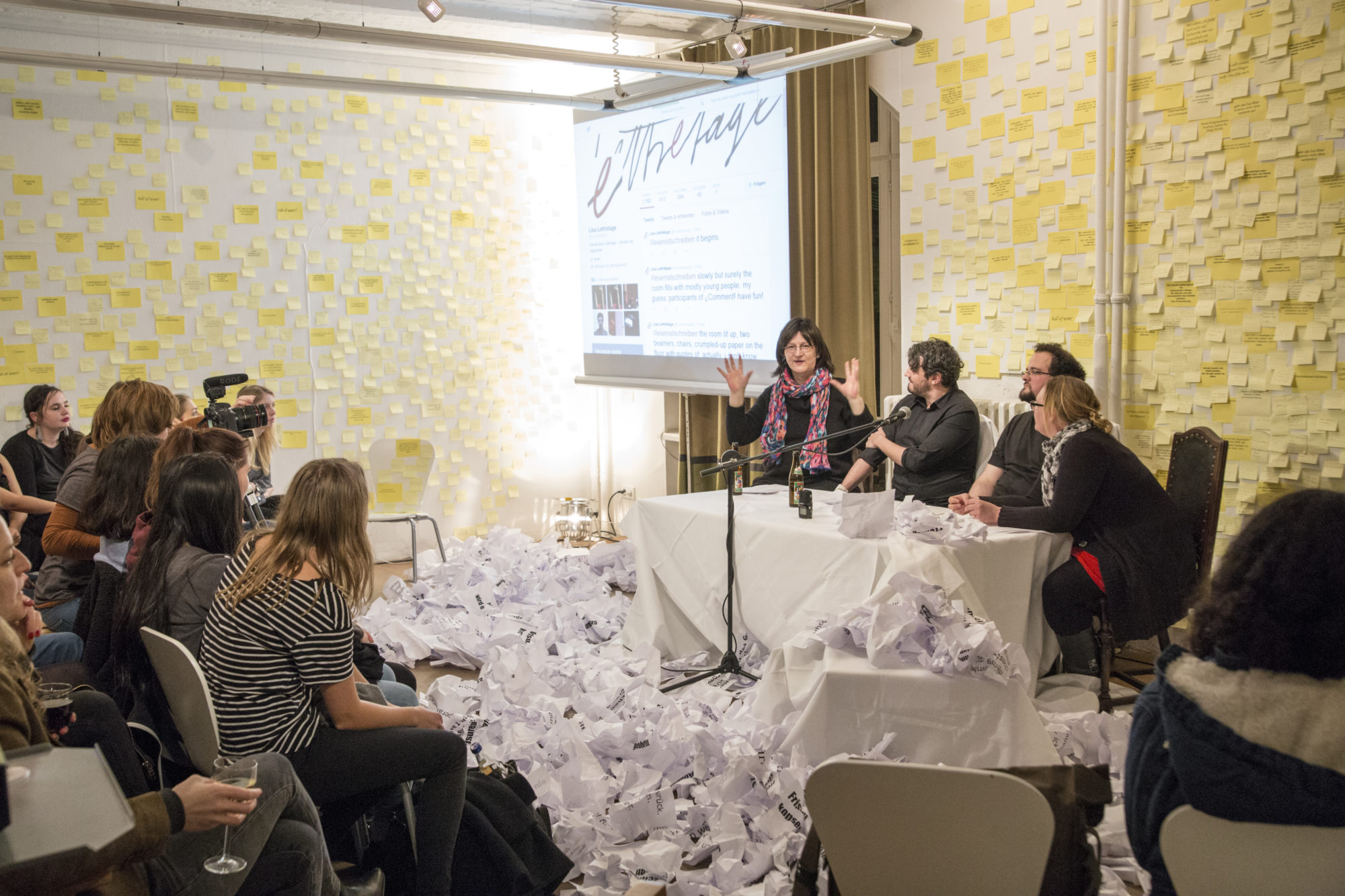Seit 2006 finden in der Lettrétage ca. 120 öffentliche Literaturveranstaltungen jährlich statt – Lesungen, Workshops, Diskussionsrunden, literarische Performances und Formate dazwischen. Bekannte und unbekannte Autor*innen und Künstler*innen verschiedener Sprachen und Nationalitäten sind hier schon aufgetreten.
Seit 2013 liegt der Programmfokus u.a. auf neuen Wegen der literarischen Präsentation und Live-Produktion: Dazu zählen u.a. die internationalen bzw. transnationalen Literaturfestivals „Soundout!“, „¿Comment!“, „Berlinisi“ und „Syn_Energy“, aber auch das viel beachtete Netzwerkprojekt „CROWD“ und multimediale Projekte wie die Reihe „CON_TEXT“ oder das „Poetry Audio Lab“. Eine vollständige Liste der Lettrétage-Projekte finden Sie hier.
Als Ankerinstitution für die freie Literaturszene Berlins stellt die Lettrétage außerdem ihre Räume für Literaturveranstaltungen aller Art zur Verfügung. Zahlreiche freie Veranstalter*innen nutzen unsere Infrastruktur regelmäßig – für Literatur-Workshops, Lesereihen in verschiedenen Sprachen und Buchpräsentationen. Mehr zu den Möglichkeiten der kostenlosen Raumnutzung erfahren Sie hier.
Auf dieser Seite präsentieren wir einen nicht vollständigen Einblick in unser vergangenes Programm.
Veranstaltungen
Termin Informationen:
-
Fr15Mrz202420:00 UhrLettrétage in der Veteranenstraße 21, Admission: free
LIVE: Paul Brody’s Electro & Poetry & Trumpet
Reading and Concert by Paul Brody

(c) privat SPRACHMELODIEKLANGFARBENMELODIE: Part 4 of Paul Brody’s live electronics & poetry concert will feature the voices of poets that Brody recorded in the past year. Each concert explored different ways of combining poetry and music, always with the idea of creating what Brody calls musical translations of poems.
Two of the writers, Uljana Wolf and Christian Hawkey, were already working with poetry via homophonic translation, or when a poem is translated from the sound of the phrases rather than the meaning of the words. Brody’s compositions and improvisations extend homophonic translation in that he draws inspiration from both the sonic element of the poems well as the expression of the poet’s own voice.
Note: Come early. Stay late!The previous concerts have been full, and the audience has enjoyed an after-show party with ambient music based on the voices of the poets. Vowels expand into long tonal passages, consonants cut into grooves, and syllables are flushed with tonal colors.

Copyright: Paul Brody Paul Brody was born in California, USA, and trained as a musician at the New England Conservatory of Music in Boston. Brody works regularly as a sound artist, composer and trumpeter at the Théâtre de Vidy in Lausanne, the Münchner Kammerspiele, the Berliner Schaubühne, the MC93 Paris, the New York Harlem Opera and the Vienna Burgtheater, among others. He works closely with the music producer John Zorn. His album HINTER ALLEN WORTEN, which features artists such as Clueso, Meret Becker and Jelena Kulijic, was on the best list of the German Record Critics' Award. Paul Brody was nominated for the Europe Broadcasting Festival and the Vienna International Feature Festival for his work as a sound artist. His sound art works have already been heard on WDR, Deutschlandradio, the Jewish Museum Berlin, the MuseumsQuartier Vienna and at Transmediale Berlin. He is currently writing an opera for the Opéra National de Lorraine in Nancy. He works closely with the theater directors David Marton and Hans-Werner Kroesinger.
Workshops & Infoabende
Termin Informationen:
-
Di20Nov201819:00Eintritt frei
Berliner Lektorat: Details zum Sprechen bringen
Schreibtipps zur Detailarbeit mit Karla Schmidt

©privat Durch gut ausgewählte Details kann ein Text an Dichte, Lebendigkeit und Tiefe gewinnen. Nach dem Prinzip ‚pars pro toto‘ – ein Teil steht fürs Ganze – können sie Situationen charakterisieren, Handlung vorbereiten und eine Menge über das Innenleben von Figuren verraten. Voraussetzung dafür ist, dass es keine willkürlichen Details sind, die den Text lediglich ein wenig möblieren, damit es nicht so hallt. In der Veranstaltung werden wir Ihnen Beispiele für einen eher hinderlichen als auch für den lohnenden Einsatz von Details zeigen.

©privat Karla Schmidt ist freiberufliche Autorin und Lektorin und hat für die "Schule des Schreibens" den Lehrgang "Romanwerkstatt" entwickelt. Sie lebt mit ihrem Mann und zwei Töchtern in Berlin.
